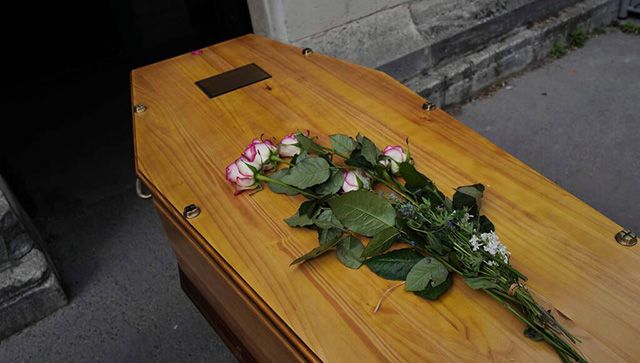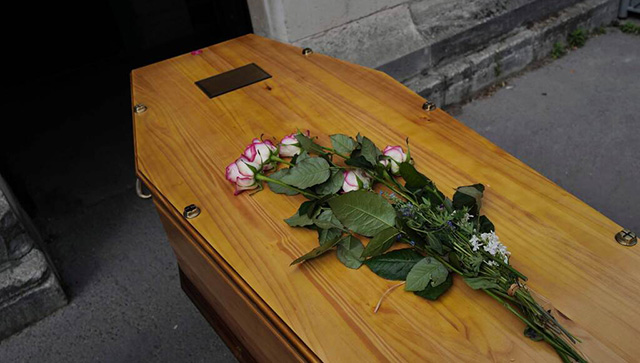SINCE THE CORONAVIRUS pandemic brought the world to a halt, the terms in which we speak of death have changed drastically. The world over, people are grappling with the sheer scale of the loss of life. The front page of a recent edition of The New York Times’ featured the names, ages, jobs and locations of 1,00,000 people who had died of the virus. The Boston Globe ran 21 pages filled with obituaries in late April – a surge from a previous 16 pages the week before.
But it’s not just about numbers; death and mourning have a new, unrecognisable face now. In India, reports and accounts that began surfacing within a week of mandatory social distancing painted a distressing picture: of people dying alone in hospital beds, away from their loved ones; of families being unable to unite to bid a member goodbye because they live in different parts of a city, or worse, state or country; of the suspicion that follows those who survive the deceased, because neighbours and outsiders wonder what the cause of death was.
Feeling out of breath and overwhelmed is the natural reaction to all this. And no amount of meditation and reflection is truly enough to prepare you – especially if you lose a loved one. Grief is grief, one of my friends recently wrote in an email, even if it is in the middle of a pandemic. Even if you know it’ll happen someday.
***
ABOUT 15 YEARS ago, when my maternal grandfather returned home after a prolonged stay at the hospital and was confined to his bed, it felt as though life had made its way back into our home (as ironic as this may sound). I was all of 10 then, and his absence from the house combined with my inability to fully understand what having a stroke implied or what it did to one’s body, had convinced me that he had died or disappeared.
Ten years later, when my grandmother was confined to her bed after suffering a fall and fracturing a leg — in addition to Parkinson’s and aphasia, conditions she would later be diagnosed with — I could tell it was death, not life, making a slow march into our home. Now, I was old enough to understand how aging works, how signs of vitality slowly but eventually leave the human body.
When you’ve seen three grandparents degenerate and become dependent on palliative care, you begin to predict the pattern of events that will mark the end of their existence: the inability to walk, the need for diapers, the shift from feeding themselves to being fed, frequent medical complications. The indignity of it all, the realisation that they resemble more closely infants than who you knew as your grandparent.
This is not to say that they don’t remain your grandparents; no, the love is quite the same. But the distance between my grandmother’s heart and my own grew as she was able to speak less and less. My mother insisted that she could still register our presences — this made the situation a little less heart-breaking.
What I couldn’t have anticipated was the space, both physical and emotional, that would be put in place between us by the COVID-19 pandemic and social distancing norms.
I would make bi-weekly trips to my grandmother’s home to deliver groceries and medicines, but because she was old and had a weak immunity, I could not hug or kiss her, for fear of putting her at risk.
***
THAT MORNING WHEN my mother received a phone call from my grandmother’s nurse, I could tell from her short sentences and low voice that something bad had happened. Before I could walk up to her and put an arm around her, she was making a checklist of safety measures to take before we stepped out, and while at my grandmother’s.
Mourning is tough enough, but how do you do it with a mask-covered face and sanitised, cool hands?
The idea of seeing someone for the last time on video call seems grotesque, but it is all we could offer to many of the people who loved my grandmother. We had to turn away neighbours because of the fear of infection and warn others who knew her against paying a visit, should they be caught for travelling or turned back.
I dreaded the ride in the ambulance to the crematorium because it is one of the most heart-wrenching parts of the funeral process; even this was punctuated by the act of sanitising our hands.
I could look at the silver linings: she didn’t die of the virus, she died at home, she went away in her sleep, she wasn’t in physical pain. But counting your blessings at such a point can feel like it is cheapening the value of life. Surely we deserve better, to mourn in the way we would like to, I wondered.
***
STANDING SEVERAL FEET apart, wearing a mask when outdoors, washing hands vigorously — these have become rituals we strictly adhere to now, but they can be just as easily forgotten. Ask anyone who has mistakenly touched their face at a public place ever since the outbreak.
On the other hand, offering a shoulder to cry on, wanting to hold someone’s hand, the urge to embrace — these are engraved into our emotional makeup . And in this new, unknown world we inhabit, it is such impulses, coded into our muscle memory, which we must clamp down on.
Mourning is already a complicated, non-linear and subjective experience. The pandemic makes it harder to navigate.
Though death has assumed a sort of omnipresence during the pandemic – in statistics in news reports; in apps that tell us about containment zones; in everyday conversation about fear and inevitability; in the realisation that for the marginalised and poor, the nation-wide lockdown has been graver than the disease itself – we operate on the hope and belief that we will not be touched by death. The passing of a loved one undoes this hope, even though their death may not be related to the virus.
At the crematorium, as we waited to receive my grandmother’s ashes, we thought twice about whether it was safe to sit on the benches, eventually giving up collective speculation; we were all too exhausted from what had occurred in the last few hours. I remember wondering how peaceful this space was, in the shade of trees whose flowers stitched together a gentle carpet on the floor. It was the first time we had a moment to ourselves, now that the funeral was taken care of and phone calls had been made to all the people who needed to hear the news.
We exchanged stories about my grandmother, and I hung on to each word, especially of those stories which occurred before my birth, many of which I was listening to for the first time. My aunt – my mother’s sister – suggested that we meet every month after the lockdown ends at Amma’s house, to commemorate her spirit and remember the good times. Perhaps for families such as ours, mourning may not be incomplete or compromised after all, merely deferred to a time when the world begins to look like itself again.
Also read on Firstpost — Rebuilding a home: A prolonged lockdown allowed my family to grieve what is lost, find solace in what remains


)




)
)
)
)
)
)
)
)